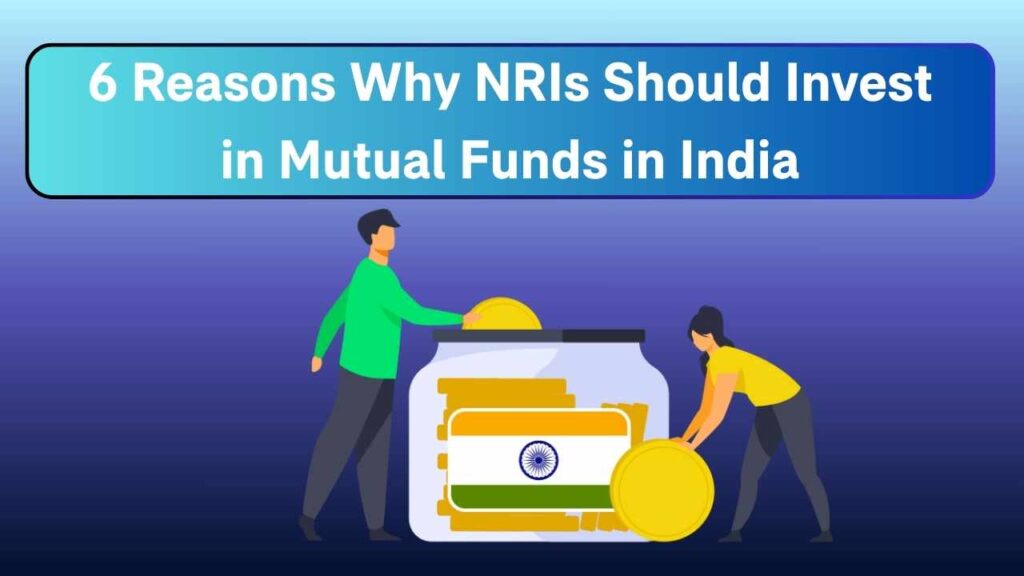Non‑Resident Indians (NRIs) tend to seek investments that yield good returns with acceptable risk. Among numerous options, mutual funds in India are a versatile choice. Mutual funds collect money from several individuals to purchase a combination of shares, bonds, or other securities.
Expert fund managers perform the research and make day‑to‑day decisions for you. In this post, we’ll explore six solid reasons why NRIs should consider investing in Indian mutual funds.
6 Reasons Why NRIs Should Invest in Mutual Funds in India

1. Strong Indian Growth Story
India is one of the fastest‑growing major economies in the world. A young, English‑speaking population and business‑friendly reforms have fueled this rise.
- Demographic gift: Over half of India’s people are under 25, giving a boost similar to what China saw decades ago when its workforce was young and growing.
- Government reforms: Initiatives like demonetisation, Goods and Services Tax (GST), and easier business registration have made India more attractive for investors and companies alike.
All of these factors mean India’s companies have strong growth potential—an advantage that can help your mutual fund investments grow over time.
2. Better Investment Option Than Real Estate or Gold
NRIs once favoured Indian real estate and gold. But both have shown slower growth recently:
- Real estate: Oversupply in many cities has led to falling prices and longer sale times.
- Gold: Prices have been flat or negative in recent years.
In comparison, many mutual funds have delivered higher returns over the past decade. Plus, you can start investing with small amounts (as low as ₹500), making mutual funds accessible even if you don’t want a large commitment.
3. Low Effort and Time Required
Investing directly in stocks or bonds demands a lot of research, monitoring, and knowledge. Mutual funds simplify this:
- Expert management: Skilled fund managers and research teams handle all the buying, selling, and analysis.
- Set and forget: Once you choose a suitable fund, you only need to check its performance occasionally to make sure it still matches your goals.
This “hands‑off” approach saves time and ensures your money is managed by professionals.
4. Easy and Completely Online
As an NRI, you need a simple, reliable way to invest from abroad. Many platforms—such as Groww—in India offer:
- Fully online process: From KYC (Know Your Customer) verification to investing and redemption, everything happens online with secure, paperless steps.
- 24/7 access: Manage your investments anytime, anywhere in the world.
With strong encryption and AMFI (Association of Mutual Funds in India) registration, these platforms make investing safe and convenient for NRIs.
5. Built‑in Diversification
Putting all your money into one stock or bond is risky. Mutual funds automatically spread your investment across many assets:
- Spread risk: An equity fund might hold 45–90 different companies, so one company’s poor performance won’t derail your entire investment.
- Professional rebalancing: Fund managers adjust holdings to keep the mix aligned with the fund’s goals.
This automatic diversification reduces risk and makes investing simpler than managing multiple individual assets.
6. Benefits of DTAA (Double Taxation Avoidance Agreement)
India has DTAA treaties with over 85 countries. DTAA helps you avoid paying tax twice on the same income:
- Capital gains tax: For example, short‑term gains in equity funds are taxed at 15% in India. If your country taxes those gains at 30%, DTAA means you pay just the difference (15%) locally.
- Smooth filing: DTAA clauses let you claim credit for taxes paid in India when you file your overseas tax returns.
This agreement makes mutual fund investing more tax‑efficient for NRIs.
Conclusion
For NRIs who want growth, ease of investment, and professional handling, Indian mutual funds provide the perfect mix. The economic prospects of the nation, convenience of online investment, diversity through automation, and tax advantages under DTAA all combine to make a persuasive argument. No matter if you begin with ₹500 or more, mutual funds enable you to be a part of the Indian growth story without the inconvenience of direct stock selection or real estate management.
Preferably, review the objectives of the fund, its performance history, expense ratio, and your risk tolerance before investing. If you require personalized guidance, consider contacting a certified financial planner. With good decision-making, mutual funds can be a very useful vehicle for NRIs to grow their wealth and achieve their financial objectives.
Disclaimer:
The information provided in this blog post is for educational and informational purposes only and should not be construed as financial or investment advice. Mutual fund investments are subject to market risks, and past performance does not guarantee future results. You should carefully consider your investment objectives, risk tolerance, and personal financial situation before investing. Always read the scheme information document (SID) and key information memorandum (KIM) of the mutual fund carefully. Consult a qualified financial advisor or tax professional to understand the suitability of any investment and the tax implications associated with it. The author and publisher of this blog assume no responsibility for any losses or damages resulting from decisions made based on the information contained herein.











